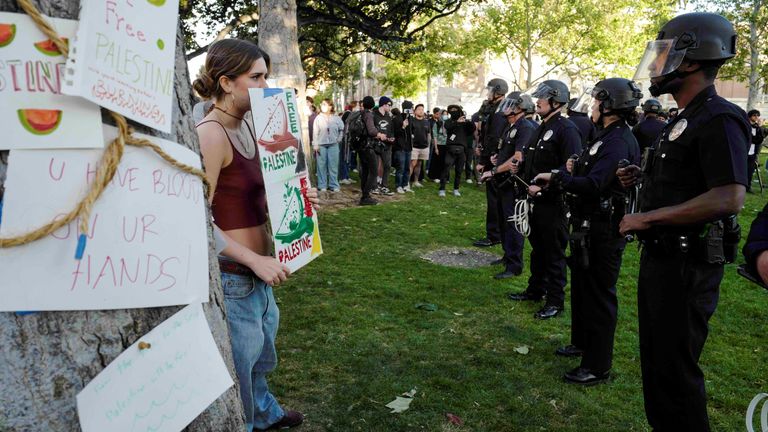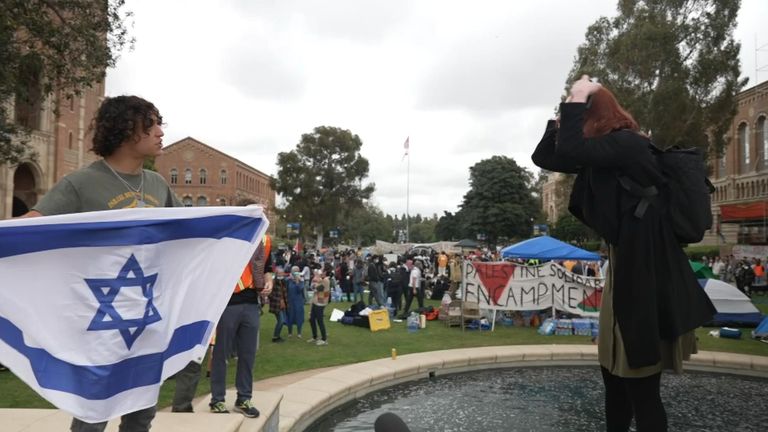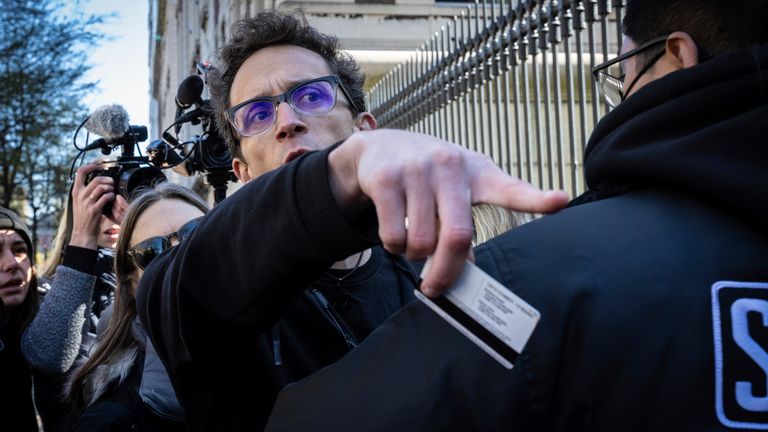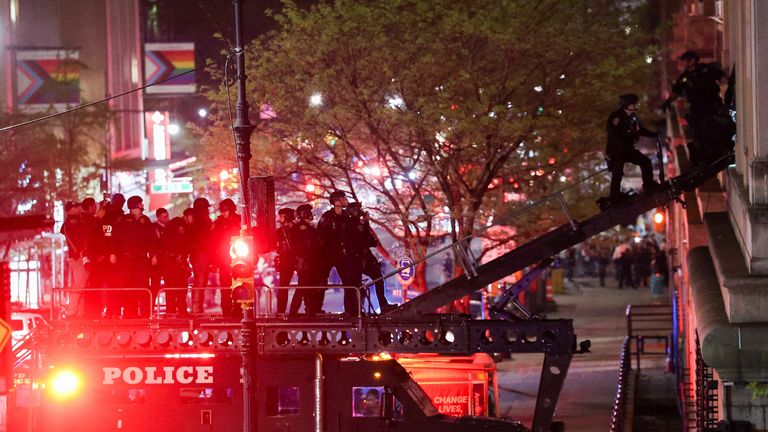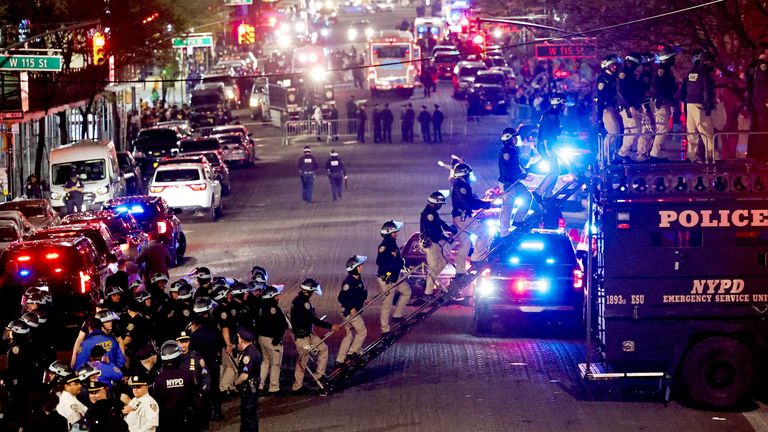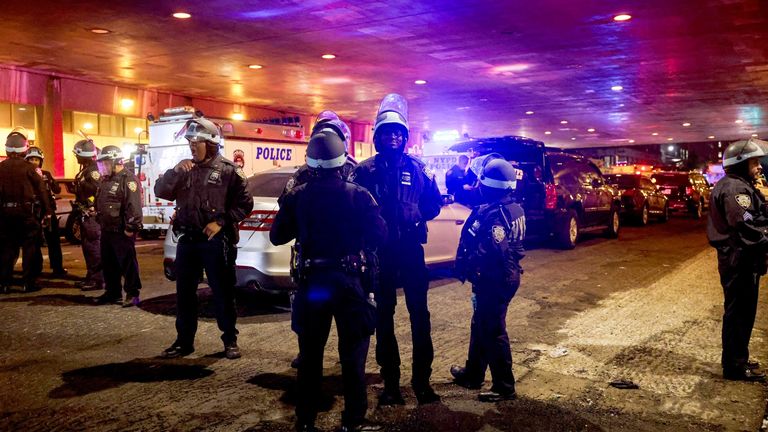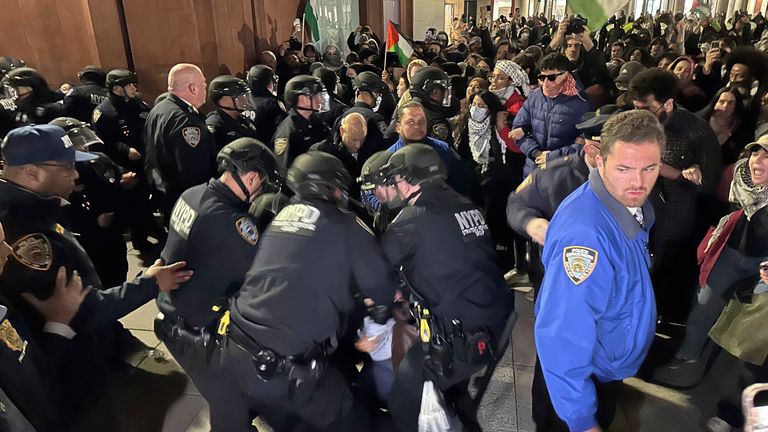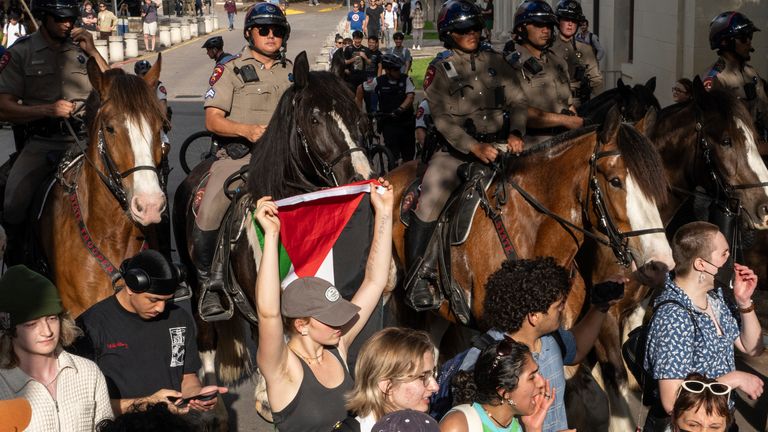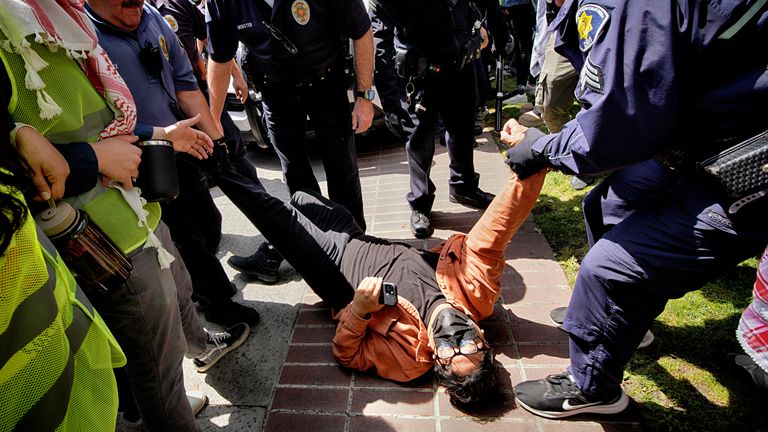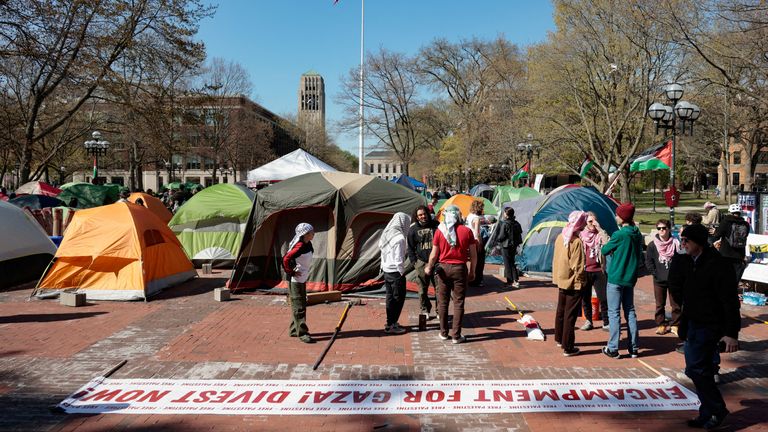Why are university students protesting in the US?
Protesters have set up encampments on campuses across the country - and hundreds have already been arrested. What are their demands and how have things escalated?
Friday 3 May 2024 12:40, UK
Protests over the Israel-Hamas war have reached boiling point at US universities, leading to the arrests of hundreds of protesters on campuses across the country.
Police have been involved in clashes with pro-Palestinian protesters who have set up encampments on dozens of campuses.
But what are the students' demands, how have things escalated and where have people been arrested? Here's what has happened so far.
What are the protests about?
The message from the students in encampments has been simple: they want their universities to stop doing business with Israel - or any companies that support its ongoing war in Gaza.
The demand has its roots in the Boycott, Divestment and Sanctions movement, a decades-old campaign against Israel's policies toward the Palestinians.
But the specifics vary from each set of protesters at different universities. Among them are these key demands:
• Stop doing business with military weapons manufacturers that are supplying arms to Israel
• Stop accepting research money from Israel for projects that aid the country's military efforts
• Be more transparent about what money is received from Israel and what it's used for
• Stop investing college endowments with money managers who profit from Israeli companies or contractors.
Endowments are the holdings and investments that institutions of higher education, foundations and some nonprofits manage as a kind of perpetual savings account.
On many campuses, students pushing for these changes say they don't know the extent of their university's connections to Israel. Universities with large endowments spread their money across a vast array of investments, making it challenging to identify where it all lands.
Read more:
Student anti-Israel protests continue to sweep the US
University campus protests encapsulate a moment of febrile divisiveness
Universities are required to report gifts and contracts through foreign sources, but the government has long said these sources are "massively underreported".
Around 100 US colleges have reported gifts or contracts from Israel totaling $375m (£300m) over the past two decades, according to the Education Department database.
There have also been pro-Israel counter protests on several campuses, with some Jewish students saying the protests have veered into antisemitism and made them feel unsafe on their university's premises.
What sparked the protests?
The mass protests escalated dramatically across the country after students set up a tent encampment at Columbia University in New York on Wednesday 17 April, demanding the school divest from companies they claim "profit from Israeli apartheid".
It was a strategy a small group of pro-Palestinian student activists had been planning for months, though one of them, Columbia graduate student Elea Sun, said a lot of the subsequent protesting has been heavily improvised.
"There's been a lot of work, a lot of meetings that went into it, and when we finally pulled it off, we had no idea how it would go," they said. "I don't think anyone imagined it would take off like it did."
Police tried to clear the encampment on 18 April, arresting 108 protesters in the process. But those arrests have proved an inspiration for other students across the country and motivated protesters at Columbia to regroup.
There has been some coordination in the country-wide protests, as students at Columbia held a phone call with around 200 other people interested in starting their own camps at other universities ahead of the week commencing 22 April.
But they haven't been orchestrated by one particular movement; most have been put together by separate student groups. In many cases, various student groups at one university have banded together to put the protests together.
Escalation at Columbia University
The encampment had become a calmer place after 18 April, as a dialogue was opened between the university and students.
But the situation escalated again when police in riot gear raided one of the university's halls and arrested around 30 to 40 people on Tuesday 30 April.
The raid came hours after New York City Mayor Eric Adams said the demonstration at the Ivy League school "must end now", adding it had been infiltrated by "professional outside agitators".
The university confirmed it had called in the New York Police Department (NYPD) after protesters "chose to escalate the situation through their actions".
"After the university learned overnight that Hamilton Hall had been occupied, vandalised, and blockaded, we were left with no choice," a university spokesman said in a statement.
The students maintained they did not pose a danger and called on police to back down.
Police confront protesters at UCLA
Police descended on the encampment at University of California Los Angeles (UCLA) on 2 May, arresting students.
They met with resistance from protesters, who had erected barricades and were camped out with hard hats, goggles and respirator masks.
Here is a summary of where other major campus protests have led to mass arrests so far:
New York University (NYU)
More than 100 students and staff were arrested at NYU on 22 April.
Officers moved on the crowds shortly after they set the demonstration a 4pm deadline to disperse, and claimed that protesters were joined by people "whom we believe were not affiliated with NYU".
Several tents had been set up in the plaza where many were protesting in. A group of pro-Israel counter-protesters had also been in the plaza Monday afternoon.
In the evening, a line of university staff members linked arms in front of the protesters to section them off from police before they were arrested and taken away themselves.
A spokesperson for the NYPD confirmed 120 people were taken into custody - 116 of whom were released with summonses for trespass, giving them a future date to appear before a judge or magistrate.
The remaining four were issued with desk appearance tickets for more serious offences - meaning they are required to appear at a criminal court on a future date.
Yale University
Police arrested 48 protesters on 22 April, including four who were not students, after they refused to leave an encampment on a plaza at the centre of the university's campus in New Haven, Connecticut.
California State Polytechnic University
Students seized two buildings on the university's campus on 22 April, using furniture, tents, chains and zip ties to block themselves in. Police say three students have been arrested, but the protest is still ongoing and the campus has been forced to close until at least next week.
"Numerous laws have been broken, including resisting arrest, destroying and damaging property, criminal trespass, and more," a university statement read on Wednesday.
The Ohio State University
About 50 protesters had gathered on campus on 23 April to share stories about their connections to the Palestinian people before marching, an Ohio State spokesperson said.
Two pro-Palestinian students were arrested during the protest and charged with criminal trespassing after "repeated warnings to be quiet", they said.
Emerson College
Protests began on 23 April, when about 80 students and other supporters occupied a busy courtyard on the downtown Boston campus.
The next day, college officials warned the students that some of the protesters were in violation of city ordinances, including by blocking a right-of-way and fire hydrants, violating noise laws and setting up tents in an alley owned by the city.
The college said in a statement that campus police were offering escort services for students after officials received credible reports of some protesters engaging in "targeted harassment and intimidation of Jewish supporters of Israel".
Police said 108 people were arrested in protests around the university on the night of 24 April and four officers suffered non-life-threatening injuries - three minor and one "more serious". No protesters were injured, they added.
Videos on social media showed police and the pro-Palestinian protesters clashing.
The University of Texas
Police officers and state troopers forcefully arrested 33 students protesters and a local news photographer on 24 April after university officials and the governor called authorities.
Protesters said they had planned a walkout and march to the main campus lawn, where students would occupy the space and host events throughout the afternoon. But the university said in a statement that it would "not tolerate disruptions" like those at other campuses.
University of Southern California
93 people were arrested at the university on the evening of 24 April, the Los Angeles Police Department said, as protests devolved into vandalism and confrontations.
Northeastern University
About 100 people were detained at a pro-Palestinian protest at Northeastern University's Boston campus on Saturday 27 April, university officials said.
"What began as a student demonstration two days ago, was infiltrated by professional organisers with no affiliation to Northeastern," the university said in its statement on X.
The university said that of approximately 100 people police detained, students "who produced a valid Northeastern ID were released".
"They will face disciplinary proceedings within the university, not legal action," the statement said. "Those who refused to disclose their affiliation were arrested."
Which other US campuses have had protests?
As of 30 April, there had also been protests at the following universities:
Arizona State University
Auraria Campus
Brown University
California State University, Sacramento
City College of New York
Barnard College
Cornell University
Emory University
Fashion Institute of Technology
George Washington University
Harvard University
Indiana University Bloomington
Institute of Political Studies
Massachusetts Institute of Technology
McGill University
Michigan State University
Northwestern University
Portland State University
Princeton University
Purdue University
Rice University
Swarthmore College
The New School
Tufts University
Tulane University
University of Alberta
University of California Berkeley
University of Connecticut
University of Denver
University of Florida
University of Georgia
University of Maryland
University of Michigan
University of Minnesota Twin Cities
University of New Mexico
University of North Carolina-Chapel Hill
University of Pennsylvania
University of Pittsburgh
University of Rochester
University of Utah
Vanderbilt University
Virginia Tech
Washington State University
Are there protests at any UK universities?
A small handful of occupations and protests have sprung up at UK universities, which included the following as of 3 May:
Warwick University
Tents were put up on the campus piazza on 25 April by Warwick Stands With Palestine, a coalition of student and staff organisations.
In a statement on 30 April, the university said it was "working to begin discussions with the demonstration's organisers"
University of Leeds
The Leeds Palestine Solidarity Group launched a "Gaza solidarity encampment" on 1 May, the same day it had planned a student walkout.
University College London
UCL Action for Palestine organised a rally on 26 April, following a 34-day occupation of a university building that ended on 15 April.
On the day of the protest, Sky News' Yalda Hakim asked UCL Action for Palestine spokesperson Amna Ghaffar why we aren't seeing the same scenes on UK campuses as we are in the US.
She said in the US, there has been collaboration between universities and law enforcement that has led to arrests of students.
She adds: "In the UK, although there has been consistent escalation and political organisation from students, the universities are taking more of a silencing approach".
"Repression is happening. The repression on campuses here and those in America are symptoms of the same issue but manifesting in different forms."
Manchester University
Manchester University students have set up "Manchester Camp of Resistance for Palestine" on Brunswick Park.
They have said they will stay there until the university meets demands including ending its partnership with BAE Systems and cutting ties with Tel Aviv University and the Hebrew University of Jerusalem.
Bristol University
Protesters have set up tents in the Royal Fort Gardens demanding divestment from the arms industry and protection of "academic freedom and student safety".
Goldsmiths
Students at Goldsmiths occupied the university library on 1 May.
"We want divestment, more scholarships for Palestinian students, revoking of the IHRA definition of antisemitism and scrapping the protest guidelines and use of bodycams at student protests," organisers Goldsmiths for Palestine said.
Newcastle University
An encampment organised by Newcastle Apartheid off Campus was set up on campus on 1 May.
What about other protests around the world?
There have been protests, occupations and sit-ins at universities from France to New Zealand, including the following:
Argentina: New York University, Buenos Aires
Australia: University of Melbourne, University of Sydney, University of Queensland, Australian National University in Canberra, University of Adelaide
Canada: McGill University, Concordia University, University of British Columbia, Vancouver
Egypt: American University in Cairo
France: Paris Institute of Political Studies (Sciences Po), Sorbonne University
Germany: New York University, Berlin
India: Jawaharlal Nehru University, New Delhi
Italy: Sapienza University, Rome, University of Turin
Japan: University of Tokyo
Kuwait: Kuwait University
Lebanon: Lebanese American University
New Zealand: University of Auckland
Spain: University of Valencia
Yemen: Thamar University
How are US universities dealing with protesters?
Some universities have been negotiating with them and allowing them space to protest peacefully, while others have quickly turned to law enforcement to prevent demonstrations from progressing.
Universities such as Columbia have tried both tactics, asking law enforcement for help a day after the protests initially sparked, then showing the remaining protesters more patience in the following days until the police raid on 30 April.
Other universities have tried to stamp out protests before they truly form, with police cracking down on protesters early into demonstrations. After a tent encampment popped up 25 April at Indiana University Bloomington. for example, police with shields and batons shoved into protesters and arrested 33 people. Hours later at the University of Connecticut, police tore down tents and arrested one person.
On the same night at Ohio State University, police clashed with protesters just hours after they gathered. Those who refused to leave after warnings were arrested and charged with criminal trespass, said a university spokesperson, citing rules barring overnight events.
Pressure is growing on the universities to deal with the protests ahead of graduation ceremonies - most of which are planned for early May. The University of Southern California has already cancelled its main ceremony over safety concerns, but most have remained coy.
'Fine line between free speech and hate speech'
Sky News' US correspondent Mark Stone has been in New York, watching the protests unfold at NYU.
Summarising the opposing views, he said: "Gaza is the catalyst, Israel is the target.
Be the first to get Breaking News
Install the Sky News app for free


"It's clear that positions are entrenched, views are polarised and emotions are very high. Complex issues [are being] condensed to their simplest, most digestible form… so often, nuance lost.
"Even among faculty staff, there is a split in opinion. Some Jewish professors [are] very worried for their safety, others framing this in a very different way.
"There's clearly a wide spectrum of views here, and by definition that's going to mean extremism on both sides.
"It also means definitions of antisemitism, of Islamophobia, are distilled and open to interpretation. It is therefore a balance between respecting free speech and restricting it. The fine line between free speech and hate speech."

